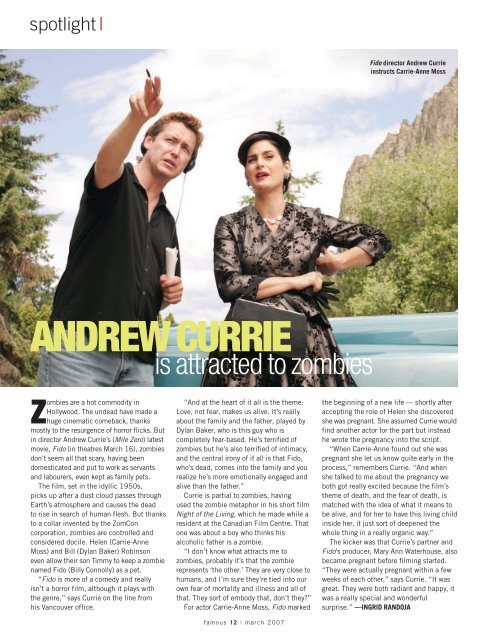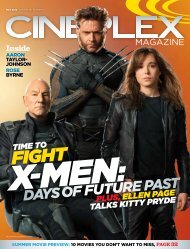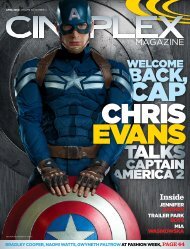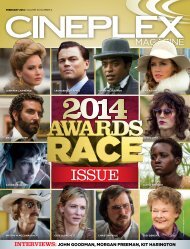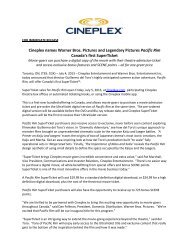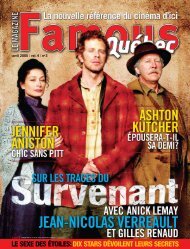PLUS: JACK BLACK, KEIRA KNIGHTLEY AND OTHER STARS ON BEING FRUGAL
PLUS: JACK BLACK, KEIRA KNIGHTLEY AND OTHER STARS ON BEING FRUGAL
PLUS: JACK BLACK, KEIRA KNIGHTLEY AND OTHER STARS ON BEING FRUGAL
Create successful ePaper yourself
Turn your PDF publications into a flip-book with our unique Google optimized e-Paper software.
spotlight I<br />
<strong>AND</strong>REW CURRIE<br />
Zombies are a hot commodity in<br />
Hollywood. The undead have made a<br />
huge cinematic comeback, thanks<br />
mostly to the resurgence of horror flicks. But<br />
in director Andrew Currie’s (Mile Zero) latest<br />
movie, Fido (in theatres March 16), zombies<br />
don’t seem all that scary, having been<br />
domesticated and put to work as servants<br />
and labourers, even kept as family pets.<br />
The film, set in the idyllic 1950s,<br />
picks up after a dust cloud passes through<br />
Earth’s atmosphere and causes the dead<br />
to rise in search of human flesh. But thanks<br />
to a collar invented by the ZomCon<br />
corporation, zombies are controlled and<br />
considered docile. Helen (Carrie-Anne<br />
Moss) and Bill (Dylan Baker) Robinson<br />
even allow their son Timmy to keep a zombie<br />
named Fido (Billy Connolly) as a pet.<br />
“Fido is more of a comedy and really<br />
isn’t a horror film, although it plays with<br />
the genre,” says Currie on the line from<br />
his Vancouver office.<br />
is attracted to zombies<br />
“And at the heart of it all is the theme:<br />
Love, not fear, makes us alive. It’s really<br />
about the family and the father, played by<br />
Dylan Baker, who is this guy who is<br />
completely fear-based. He’s terrified of<br />
zombies but he’s also terrified of intimacy,<br />
and the central irony of it all is that Fido,<br />
who’s dead, comes into the family and you<br />
realize he’s more emotionally engaged and<br />
alive than the father.”<br />
Currie is partial to zombies, having<br />
used the zombie metaphor in his short film<br />
Night of the Living, which he made while a<br />
resident at the Canadian Film Centre. That<br />
one was about a boy who thinks his<br />
alcoholic father is a zombie.<br />
“I don’t know what attracts me to<br />
zombies, probably it’s that the zombie<br />
represents ‘the other.’ They are very close to<br />
humans, and I’m sure they’re tied into our<br />
own fear of mortality and illness and all of<br />
that. They sort of embody that, don’t they?”<br />
For actor Carrie-Anne Moss, Fido marked<br />
famous 12 | march 2007<br />
Fido director Andrew Currie<br />
instructs Carrie-Anne Moss<br />
the beginning of a new life — shortly after<br />
accepting the role of Helen she discovered<br />
she was pregnant. She assumed Currie would<br />
find another actor for the part but instead<br />
he wrote the pregnancy into the script.<br />
“When Carrie-Anne found out she was<br />
pregnant she let us know quite early in the<br />
process,” remembers Currie. “And when<br />
she talked to me about the pregnancy we<br />
both got really excited because the film’s<br />
theme of death, and the fear of death, is<br />
matched with the idea of what it means to<br />
be alive, and for her to have this living child<br />
inside her, it just sort of deepened the<br />
whole thing in a really organic way.”<br />
The kicker was that Currie’s partner and<br />
Fido’s producer, Mary Ann Waterhouse, also<br />
became pregnant before filming started.<br />
“They were actually pregnant within a few<br />
weeks of each other,” says Currie. “It was<br />
great. They were both radiant and happy, it<br />
was a really special and wonderful<br />
surprise.” —INGRID R<strong>AND</strong>OJA<br />
100 2 5 25 50 75 95 98 100 2 5 25 50 75 95 98 100 2 5 25 50 75 95 98 100 2 5 25 50 75 95 98 R G B 3/C<br />
interview I ROB STEWART<br />
Swimming<br />
sharks<br />
with<br />
Director Rob Stewart on the trials of making Sharkwater I BY MARNI WEISZ<br />
About five years ago, Toronto-based wildlife photographer<br />
Rob Stewart set out to make a documentary about one of<br />
his lifelong passions, sharks. He figured it would be an<br />
informative film filled with beautiful underwater imagery, sort<br />
of like an underwater version of Baraka, the 1992 documentary<br />
about life on Earth that was made up of striking imagery from<br />
around the world.<br />
But three weeks into the shoot a string of<br />
dramatic incidents turned the movie from<br />
underwater eye candy to a human drama<br />
involving politics, criminal charges and a<br />
near-death experience. The resulting film,<br />
Sharkwater, is released in theatres this month.<br />
Stewart was doing some last-minute tweaks<br />
to the film’s colour at a Toronto editing<br />
facility when he spoke with Famous.<br />
Tell me about this film. “I tried to make just<br />
an underwater movie, then everything went to hell. While we<br />
were making the movie, the conservation group that I was<br />
working with collided with a fishing boat in Guatemala, we<br />
ended up getting charged with attempted murder in Costa Rica,<br />
and then getting arrested and exposing this corruption ring, I<br />
was filming this Taiwanese mafia. Everything went crazy and<br />
we ended up having to turn the cameras on ourselves in case<br />
we were stuck in a Costa Rican prison, so I would have a<br />
record of that. And when I came back from that main shoot<br />
I had this crazy human drama and none of the underwater<br />
Baraka that I thought I was going to make.”<br />
You contracted flesh-eating disease while you were shooting, and<br />
were taken to a hospital in the Galapagos Islands where doctors<br />
wanted to remove your leg. How did you recover from that? “Seven<br />
days of superstrong Ecuadorian antibiotics and little blue<br />
pills that made me sleep the whole time. After that I had<br />
Dengue Fever, West Nile Virus and TB. Dengue Fever is sort<br />
of like West Nile, I actually got West Nile in Toronto. I got<br />
famous 13 | march 2007<br />
This picture:<br />
A hammerhead shark<br />
in Sharkwater<br />
Below: The Ocean Warrior<br />
encounters trouble<br />
Inset: Rob Stewart shoots<br />
an underwater scene<br />
back from this trip and I was getting over<br />
Dengue and I got bitten by a mosquito in<br />
a park in Toronto and it was West Nile.<br />
And then I had latent tuberculosis that<br />
was just sitting in me. I finished university in Africa, so I<br />
probably contracted it there. It stayed dormant in me until my<br />
immune system was so devastated by the other two.”<br />
How are you now? “Good. I’m a little more sensitive, so if I<br />
miss a few nights of sleep in a row I’ll probably get sick.”<br />
Why this obsession with sharks? “There’s a lot we can learn from<br />
them. We’re living at a time on Earth when human’s survival on<br />
the planet is in jeopardy. We’re not living in balance with the<br />
natural world, we’re breaking virtually every ecological law<br />
there is on the planet. So we can look to sharks because they’re<br />
the only large animal that survived for 400-million years, figure<br />
out how they live in balance with the world. Also, there’s no<br />
other animal you can look at that’s so perfectly designed to live<br />
on Earth. I grew up as a boy catching snakes and lizards and<br />
stuff like that and sharks are sort of the ultimate cool boy<br />
animal — they’re big, they’re menacing, they’re beautiful and<br />
powerful, and nobody really likes them.”


